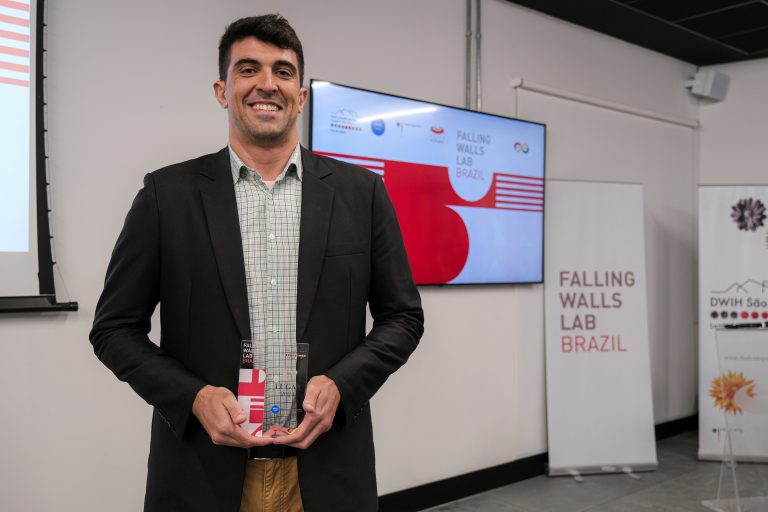MagChill, a project that uses magnetism to generate cooling or heating in air conditioning and similar equipment, was the winner of the Falling Walls Lab Brazil 2024, held on September 27th in Recife. The person responsible for presenting the idea, Guilherme Fidelis Peixer, from the Federal University of Santa Catarina (UFSC), will present it to an international jury in Berlin, at the Falling Walls global final in November.
The goal of the MagChill project was to develop a magnetocaloric air conditioner that could achieve the required temperature difference through the use of magnetic fields. The system was developed and is controlled using artificial intelligence.
A typical air conditioner works with a mechanical fluid compression system: when a fluid is compressed, it heats up, and when a fluid is expanded, it cools down. The researcher Guilherme Fidelis Peixerfrom the Graduate Program in Mechanical Engineering at UFSC, is part of the project and explains that the proposal is to magnetize and demagnetize a solid instead of compressing and expanding a fluid, using the same thermodynamic principle to perform the device's cooling and heating cycle. "By using a solid material, there is no risk of leaking harmful fluids into the environment," explains the researcher.
Artificial intelligence was implemented to refine system control and reduce energy consumption by predicting future behavior and issuing commands in advance. When a standard air conditioner is turned on, for example, it will operate at full capacity until the room is completely cooled and then shut off. It will then only turn on again when the room is already warm. With AI-powered equipment, it's possible to predict the room temperature before it's reached and maintain an average temperature without the system fluctuating.
"The great advantage of artificial intelligence is that, with this database, we can calibrate the system very quickly," explains Guilherme. Artificial intelligence was also implemented in the project alongside optimization algorithms to size the components, with the goal of improving the system.
For Professor Jaime Lozano, coordinator of MagChill, projects like this are essential to strengthening engineering training and boosting the country's technological development. Furthermore, these projects enable collaboration between the University and industry, allowing students and researchers to be constantly updated on the latest advances and needs of companies. "This enriches academic and professional development and contributes to the creation of practical solutions that directly meet society's demands," comments the professor.
The first prototype of the project is already finalized. Currently, the team is looking for partner companies to financially support the continuation of the MagChill project. Using the same cooling system, there is another project, home wine cellarwhich is currently being developed by the Polo team.
Awards
Since 2019, MagChill has received five awards from the Brazilian Association of Mechanical Sciences (ABCM/Embraer). It was also awarded Best Recorded Presentation at 9th IIR International Conference on Caloric Cooling and Applications of Caloric Materials (Thermag IX), in 2021, and received Technological Highlight as Best Work presented at 3rd Brazilian Hydrogen Congressin 2023.
Recently, the project won the Falling Walls Lab Brazil 2024in Recife. The victory guaranteed him a place in the world finals of the competition in early November in Berlin, where the researcher was able to represent Brazil.
O projeto MagChill é coordenado pelos professores Jader Barbosa and Jaime Lozano.The MagChill project is coordinated by teachers Santa Catarina Innovation Award – Professor Caspar Erich Stemmer – 2024 Editionand Professor Cristiano da Silva Teixeiraof the Laboratory of Magnetism and Magnetic MaterialsLab3Mfrom UFSC Blumenau.
The project was part of the New Technologies for Refrigeration research line, which has been running for over 15 years and is highly regarded internationally. Six departments at the University have been involved in the project over the years, involving over 45 participants.
MagChill was funded by the Minas Gerais Development Company (Codemge) and the Brazilian Company for Industrial Research and Innovation (Embrapii).


